A hard skills assessment is simply a structured way to evaluate someone’s specific, teachable abilities. Think coding tests for developers, accounting simulations for finance roles, or CAD proficiency checks for engineers. Unlike soft skills – which involve personality and interpersonal traits – hard skills are measurable, observable, and directly tied to job performance.
Why does this matter? Three words: hiring accuracy, onboarding speed, and workforce readiness.
Consider this: Companies that use skills testing in their hiring process see up to 24% better quality of hire compared to those relying solely on interviews. New employees ramp up faster because you’ve already confirmed they have the technical chops. And internally? You can identify skill gaps before they become performance problems.
- The Landscape: What Counts as A Hard Skill?
- Why OnlineExamMaker Is The Best Hard Skills Assessment Creating Software for You?
- Common Assessment Formats: Choosing Your Weapon
- How to Assess Hard Skills: Designing Effective Evaluations
- How to Build Your Hard Skills Assessment in OnlineExamMaker?
- Measuring What Matters: Tracking Assessment Impact
The Landscape: What Counts as A Hard Skill?
Hard skills aren’t one-size-fits-all. What’s essential for a software engineer means nothing to a financial analyst. Here’s how they break down across industries:
Technical Skills
Programming languages (Python, JavaScript), database management, cloud platforms (AWS, Azure), cybersecurity protocols. These are the bread and butter of tech roles, but they’re increasingly relevant across every sector as digital transformation accelerates.
Analytical Skills
Data analysis, statistical modeling, financial forecasting, market research. If your job involves turning numbers into insights, these skills are non-negotiable.
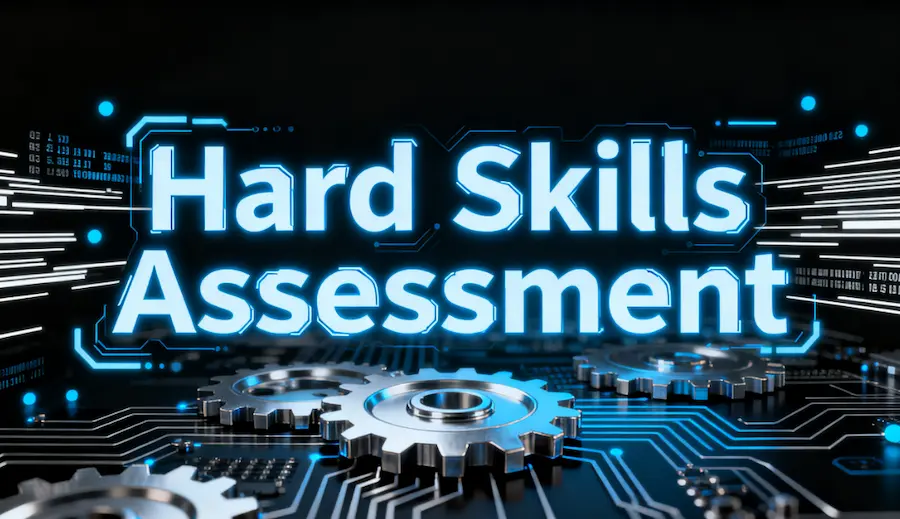
Tool-Specific Competencies
Excel wizardry, Salesforce administration, Adobe Creative Suite mastery, ERP systems. These are the practical applications that separate theory from execution.
Certification-Based Skills
Project management (PMP), accounting (CPA), healthcare certifications, trade licenses. Some skills come with official credentials – but even certified professionals benefit from practical assessment.
Why OnlineExamMaker Is The Best Hard Skills Assessment Creating Software for You?
OnlineExamMaker is a comprehensive AI-Powered assessment platform that transforms the testing process from nightmare to streamlined system. This isn’t your grandfather’s multiple-choice quiz generator. OnlineExamMaker brings enterprise-grade functionality without the enterprise-grade headaches:
- Diverse question types: Multiple choice, coding challenges, file uploads, essay responses, and even video submissions
- AI-assisted evaluation: Automated scoring for objective questions, smart suggestions for subjective responses
- Security features: Browser lockdown, webcam proctoring, plagiarism detection, and randomized question pools
- Analytics dashboard: Track completion rates, identify difficult questions, compare candidate performance
- Scalability: Test five candidates or five thousand without breaking a sweat
Create Your Next Quiz/Exam with OnlineExamMaker
Common Assessment Formats: Choosing Your Weapon
Not all hard skills testing methods are created equal. Here’s your tactical guide:
| Format | Best For | Pros | Cons |
|---|---|---|---|
| Multiple-Choice Tests | Knowledge verification, certification prep | Scalable, easy to score, cost-effective | Limited insight into application ability, guessing possible |
| Practical Simulations | Complex problem-solving, realistic scenarios | High validity, mirrors actual work | Time-intensive, requires specialized platforms |
| Work Samples | Creative roles, portfolio-based positions | Shows real capability, engaging for candidates | Harder to standardize, potential for plagiarism |
| Live Coding/Practical Tasks | Technical interviews, hands-on roles | Immediate feedback, reveals thought process | Can be stressful, requires trained evaluators |
The trick? Match the format to the skill. Testing a graphic designer? Work samples win. Evaluating a data scientist? Simulations and coding challenges reveal more than any quiz ever could.
How to Assess Hard Skills: Designing Effective Evaluations
Here’s where theory meets practice. Building a rock-solid technical skills evaluation requires more than throwing together some questions. Follow this blueprint:
Step 1: Define Job-Relevant Competencies
Start with the job description, but dig deeper. What tasks consume 80% of this role’s time? What skills separate good performers from great ones? Talk to current employees. Shadow the role if possible. Get specific.
Step 2: Align with Real Job Tasks
If your accountants spend their days reconciling statements, test that – not abstract accounting theory. If your developers debug legacy code, create challenges that mirror that reality. This isn’t academic testing; it’s a preview of actual work.
Step 3: Ensure Validity and Reliability
Validity means you’re testing what you think you’re testing. Reliability means consistent results across candidates. Achieve both through:
- Standardized prompts: Same instructions for everyone
- Clear rubrics: Objective scoring criteria, not gut feelings
- Multiple evaluators: Reduces individual bias
- Regular calibration: Ensure scorers interpret rubrics consistently
Step 4: Build in Accessibility and Fairness
Not everyone tests the same way. Accommodate disabilities with extended time or alternative formats. Consider language barriers. Avoid unnecessarily complex wording. Your goal is to measure skills, not create artificial obstacles.

How to Build Your Hard Skills Assessment in OnlineExamMaker?
Create Your Next Quiz/Exam with OnlineExamMaker
1. Set up your account and create a new exam

Navigate to the dashboard and click “Create New Exam.” Choose between timed tests, self-paced assessments, or certification exams depending on your needs.
2. Prepare hard skills questions

This is where you craft your industry-specific hard skills test. Import questions from spreadsheets, write them directly in the interface, or leverage OnlineExamMaker’s AI assistant to generate initial drafts based on job descriptions. Pro tip: Start with 30-40 questions and trim based on pilot results.
3. Configure difficulty and weighting

Not all questions carry equal importance. Mark critical skills with higher point values. Set difficulty levels so the platform can generate adaptive tests that adjust based on candidate performance.
4. Enable security measures
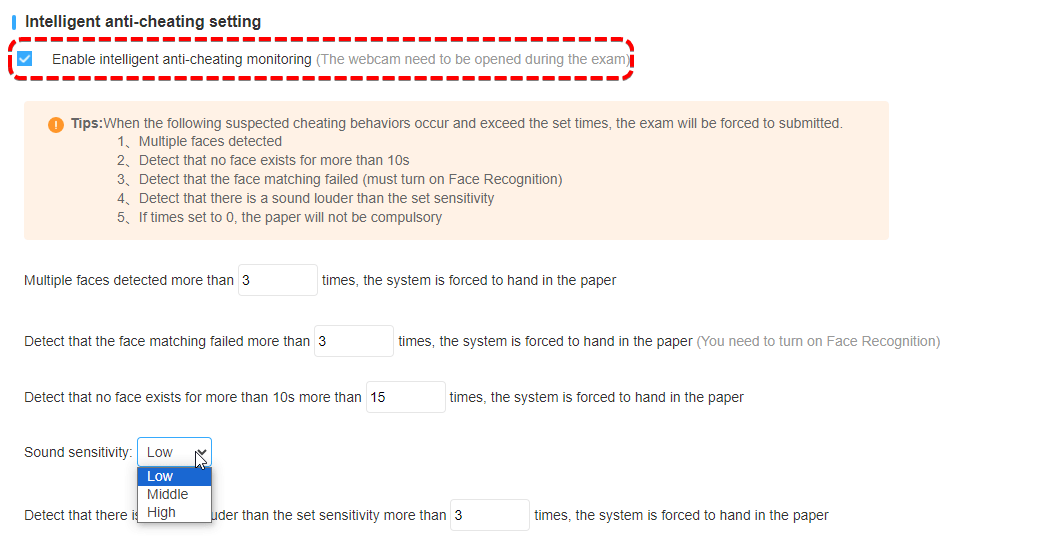
For high-stakes assessments, activate browser lockdown to prevent tab-switching. Turn on webcam monitoring if remote testing raises concerns. Set up plagiarism checks for coding challenges or written responses.
5. Customize the candidate experience
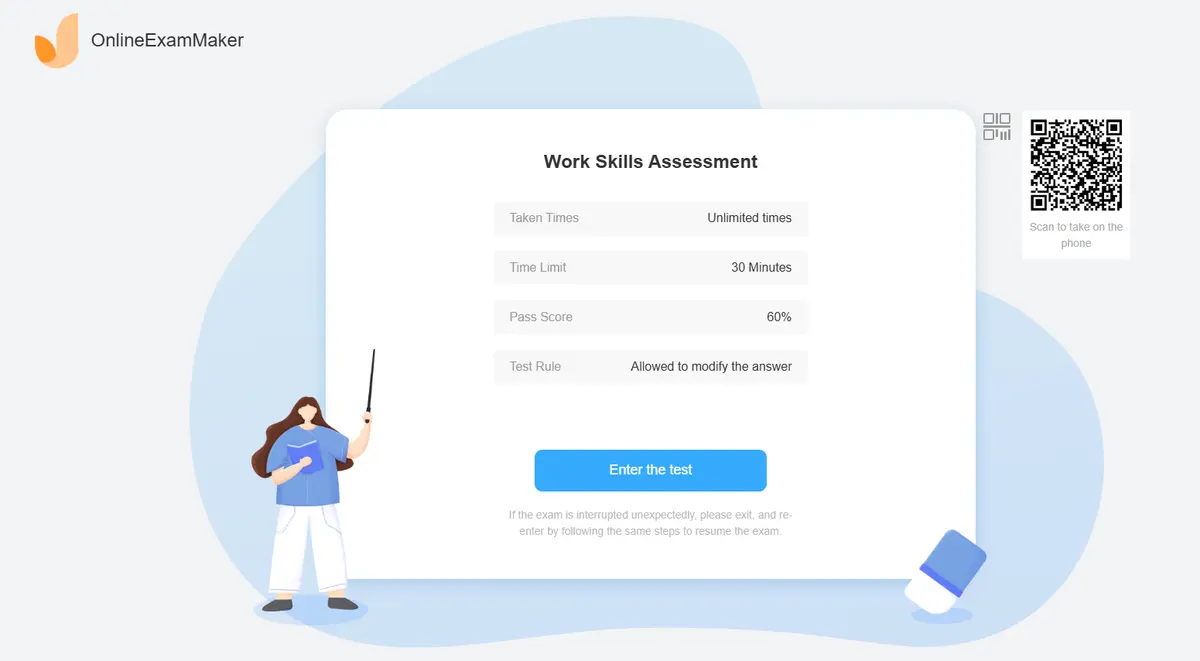
Brand the test with your company logo. Write clear instructions. Set time limits that challenge without overwhelming. Remember: You want to assess skills, not test-taking anxiety.
6. Analyze and iterate
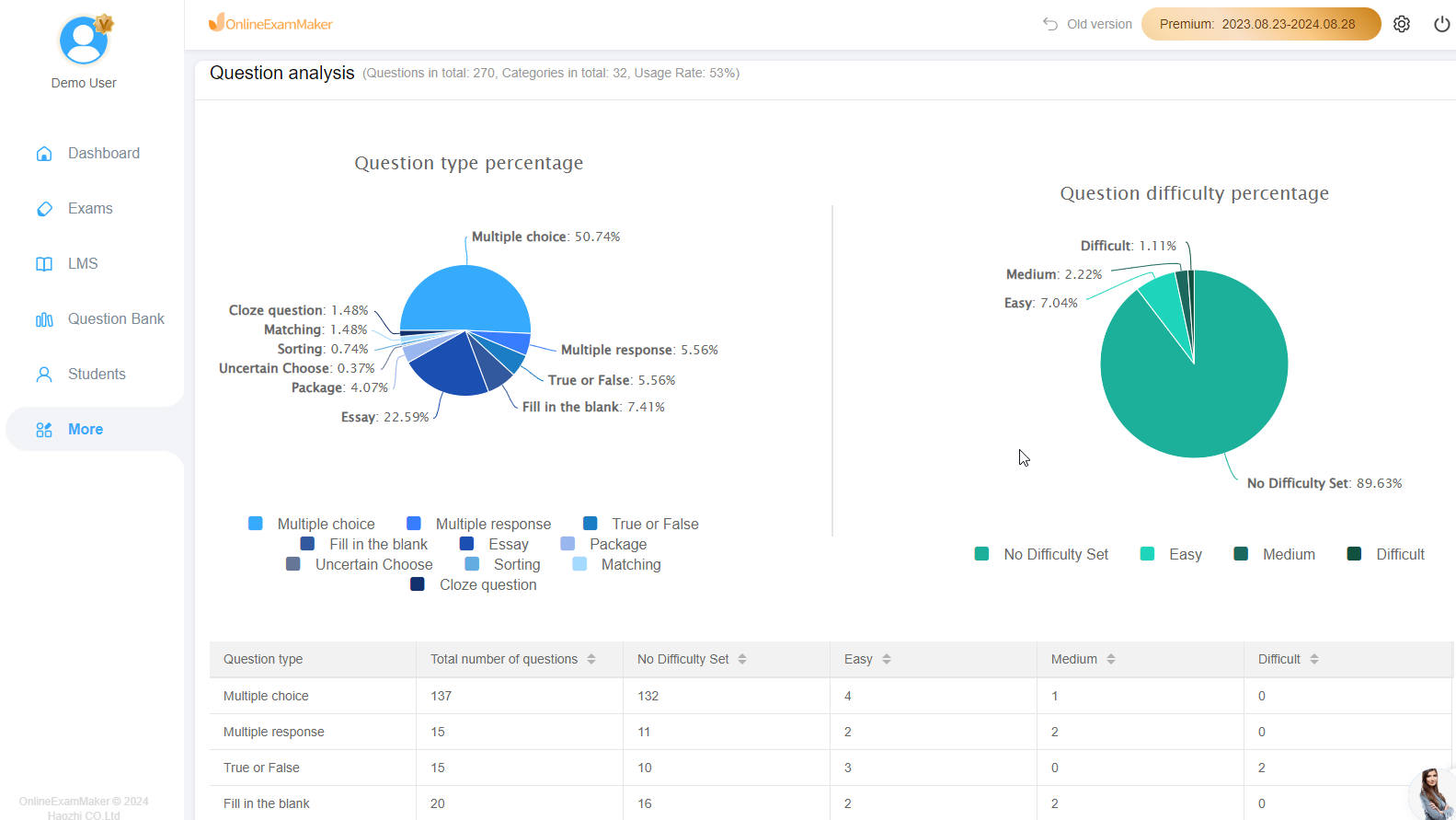
After your first cohort completes the assessment, dive into the analytics. Which questions had the highest failure rates? Were they genuinely difficult, or poorly worded? Which skills correlated most strongly with job success? Use these insights to refine your question bank continuously.
Tips to Create An Outstanding Hard Skills Test
Theory is nice. Execution is everything. Here’s how to implement competency assessment without derailing your hiring process:
Start Small, Then Scale
Don’t overhaul your entire hiring process overnight. Pick one critical role. Design one solid assessment. Test it thoroughly. Learn from mistakes. Then expand to other positions. Perfection isn’t the goal – progressive improvement is.
Communicate Transparently
Candidates hate surprises. Tell them upfront what to expect: assessment length, format, subject areas, and how results will be used. Transparency reduces anxiety and improves completion rates.
Mind Your Legal and Ethical Obligations
Data privacy isn’t optional. Obtain informed consent before testing. Store results securely. Use assessments as one hiring factor among many – never as the sole determinant. Regularly audit for adverse impact across demographic groups. If certain populations consistently score lower, investigate whether your test inadvertently measures something besides job-relevant skills.
Prevent Cheating Without Creating a Police State
Balance is key. Yes, implement security measures. But don’t turn every assessment into a monitored prison exam. For lower-stakes internal assessments, trust matters. For external hiring, reasonable precautions make sense. Consider:
- Randomized question orders
- Time limits that allow completion but discourage looking up answers
- Practical tasks that require genuine skill, not just Googling
- Follow-up interviews where candidates explain their approach
Measuring What Matters: Tracking Assessment Impact
Here’s the uncomfortable truth: If you can’t measure it, you can’t improve it. Track these metrics to validate your skills measurement approach:
Hiring Efficiency Metrics
- Time-to-fill: Are assessments speeding up or slowing down hiring?
- Offer acceptance rates: Do candidates who pass assessments accept offers more readily?
- Cost-per-hire: Factor in assessment platform costs against improved retention
Quality of Hire Indicators
- 90-day performance ratings: Do high assessment scores predict strong performance?
- Ramp time: How quickly do new hires reach full productivity?
- Manager satisfaction: Are hiring managers happier with assessment-vetted candidates?
Retention and Engagement
- First-year retention: Do assessment-hired employees stay longer?
- Internal mobility: Can you identify high-potential employees earlier?
- Skill gap closure: For internal assessments, track improvement over time
Set a baseline before implementing assessments, then measure quarterly. Look for trends, not isolated data points. And be honest: If assessments aren’t improving outcomes, adjust your approach or question whether they’re the right tool.
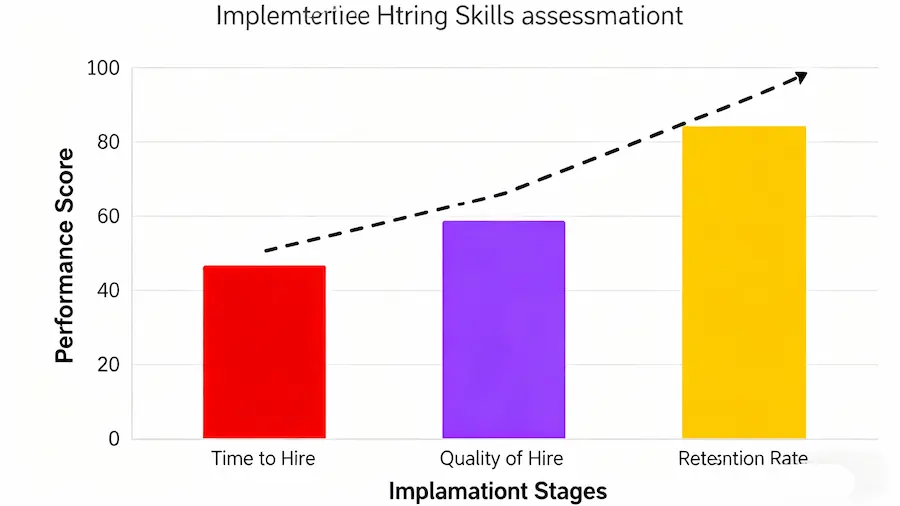
Conclusion
Hard skills assessment isn’t about making hiring more complicated – it’s about making it more accurate. When done right, you hire faster, onboard smoother, and build teams with the actual capabilities your business needs.
Start simple. Focus on one role. Use tools like OnlineExamMaker to handle the technical heavy lifting. Measure what matters. Iterate constantly. And remember: The goal isn’t finding perfect candidates – it’s finding the right ones.
Because at the end of the day, resumes tell you what people claim they can do. Skills assessments show you what they actually can.